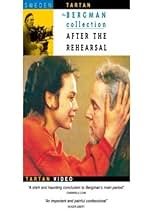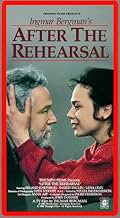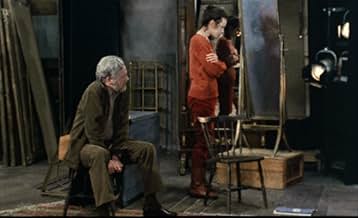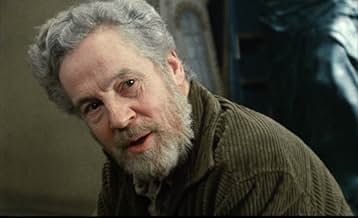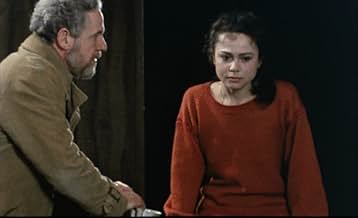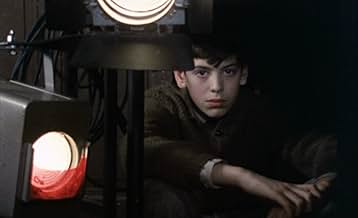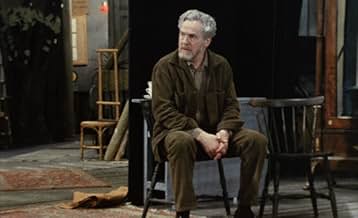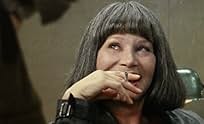NOTE IMDb
7,1/10
3,2 k
MA NOTE
Ajouter une intrigue dans votre langueAs an aging playwright interacts with the young lead in his play after everybody's gone home, he reminisces about her mother, whom he maintained a sexual relationship with before she died.As an aging playwright interacts with the young lead in his play after everybody's gone home, he reminisces about her mother, whom he maintained a sexual relationship with before she died.As an aging playwright interacts with the young lead in his play after everybody's gone home, he reminisces about her mother, whom he maintained a sexual relationship with before she died.
- Réalisation
- Scénario
- Casting principal
- Récompenses
- 2 nominations au total
Avis à la une
Essentially a playwright, adapted for the cinema, first as a screenwriter and then combining this role with that of director, Ingmar Bergman left an impressive cinematographic work but even more extensive in the theater, whether writing, adapting and directing other people's plays.
In the final phase of his career, he dedicated himself mainly to the theater and the few films he made, after the biopic that was Fanny & Alexander in 1982, were mere adaptations for the cinema or television of theater plays.
This is undoubtedly the case of this "After the Rehearsal" from 1984, which has only three characters and was filmed entirely on a stage, with a single set.
In retrospect, and considering everything that has been written and debated about Bergman since his death, particularly with regard to his relationship with the many actresses he worked with, one would say that this film is clearly autobiographical and reveals the author's sadness in dealing with old age, particularly with regard to his relationship with actresses, who continue to tempt him and seduce him, but to whom he no longer has anything to offer, other than his experience and his ability to make them blossom on stage or on screen.
A feeling shared by most men over fifty, especially those accustomed to a hectic love life, like Bergman, who was married five times and had nine children from five different women, including wives and more informal relationships.
The work is insightful and intelligent, as it could not be otherwise, with Bergman as the author, and the actors are the usual Erland Josephson and Ingrid Thulin, always magnificent, joined by a younger Lena Olin, who had already played supporting roles with Bergman since 1976, but makes her debut here, with a leading role, which would open doors for her future international career.
This is Bergman at his best, but in a static, theatrical, not very cinematic format. It is worth it for the script and performances, but as a film, it feels like too little. After all, is cinema just filmed theater, as Manoel de Oliveira believed?
In the final phase of his career, he dedicated himself mainly to the theater and the few films he made, after the biopic that was Fanny & Alexander in 1982, were mere adaptations for the cinema or television of theater plays.
This is undoubtedly the case of this "After the Rehearsal" from 1984, which has only three characters and was filmed entirely on a stage, with a single set.
In retrospect, and considering everything that has been written and debated about Bergman since his death, particularly with regard to his relationship with the many actresses he worked with, one would say that this film is clearly autobiographical and reveals the author's sadness in dealing with old age, particularly with regard to his relationship with actresses, who continue to tempt him and seduce him, but to whom he no longer has anything to offer, other than his experience and his ability to make them blossom on stage or on screen.
A feeling shared by most men over fifty, especially those accustomed to a hectic love life, like Bergman, who was married five times and had nine children from five different women, including wives and more informal relationships.
The work is insightful and intelligent, as it could not be otherwise, with Bergman as the author, and the actors are the usual Erland Josephson and Ingrid Thulin, always magnificent, joined by a younger Lena Olin, who had already played supporting roles with Bergman since 1976, but makes her debut here, with a leading role, which would open doors for her future international career.
This is Bergman at his best, but in a static, theatrical, not very cinematic format. It is worth it for the script and performances, but as a film, it feels like too little. After all, is cinema just filmed theater, as Manoel de Oliveira believed?
`After the Rehearsal', a film by Ingmar Bergman, is a reflective look at the art of theater and its practical implications in our lives. Bergman keeps to a relatively tight plot and cast - there are a total of three characters and one setting that endure over the course of 79 minutes. More than anything, `After the Rehearsal' is a study of our actions: their sincerity, what drives us to them, and how they are mirrored in the theater. It attempts to define human relationships and their high level of self-interest, at times appearing quite existentialistic. `After the Rehearsal' brazenly takes a look into social psychology, aging and theater. The story in `After the Rehearsal' focuses on playwright and director Henrik Vogler, his current star actress, Anna Eggerman, and her mother and Henrik's former lover - Rakel Eggerman. It all occurs after a rehearsal for Henrik's latest `Dream Play' when he is awoken by Anna Eggerman who is looking for her bracelet - a mere pretension to spend time with Henrik. While her desire for Henrik is obvious - he continuously refuses to yield to her flirtations. In the middle of the film, there is a long flashback where we witness Anna's alcoholic mother Rakel arguing with Henrik on the same backstage. Towards the end of the film, Henrik and Anna frenziedly create a romantic story of their future together, passionately delving deeper into their improvised story until Henrik stops it - he will never be able to carry out his desires in person at his age. Bergman's `After the Rehearsal' is not about a plotline, but rather, about unearthing the truth of our actions. During the course of the film, Henrik, while in conversation, will have a voice over which lays bare his thoughts and feelings towards who he is currently addressing. His dialogue is always an act - trying to make his words match his thoughts and thereby amassing a waste of energy. His words betray his thoughts and we learn how truly detached and distant he is from his surroundings. His words become no more than lines in a play; trying to express a thought in the most pleasing and successful way. Anna Eggerman is no better off than Henrik - she purposely lies to him so as to manipulate him and witness his various emotional responses. Rakel also epitomizes this separation from society by her professed desire for affection and company but consistent alcoholism and belligerent actions aimed towards Henrik - she is a mourner who has damned herself to wallow in her own pity. It would be accurate to dub `After the Rehearsal' as an existentialist work. Not only does it focus on man's separation from one another and the pointlessness of his actions, but it attempts to define why man acts as he does. In a self-revelation, Anna Eggerman supposes that she is acting only to please others - and that since childhood she has merely put on a stage face to get her own way. She is so absorbed by her subconscious actions that she does not realize she has become an actress offstage. Furthermore, it describes the plight of Henrik. In addition to the isolation Henrik suffers from the world, he is also plagued by his old age. As age has taken its toll, he no longer has the energy to have a relationship with Anna and can merely imagine it. His (and the film's) final words most exemplify his incapacity and detachment from the world, occurring when Anna tells him she can hear the church bells tolling as he says `I only wish that I was able to hear the bells'. `After the Rehearsal' is a meditative film that is not afraid to ask questions and propose answers. It eloquently expresses its views through a tightly-woven story that does not fail to hold its audiences attention. It dissects why man functions as he does through intense confrontations, philosophical ponderings and quiet revelations. Bergman unmasks the existential themes of distance and cold self-interest that lurk underneath our every word. `After the Rehearsal' is a complex and vital look at humanity that everyone should sit through at least once.
This is only my second Ingmar Bergman viewing, the first being the magnificent "Seventh Seal", which left me with a long lasting impression. Perhaps it is not fair to compare this little ditty to the impressive, thoughtful epic that was the former film, but it was with such unrealistic expectations that I started watching "After the Rehearsal".
Unfortunately, I left the film disappointed and indifferent. The plot revolves around an aging play director's relation to his young lead actress, and concerns itself with acting, the personal relations of people in the profession, parenthood and estrangement. Alas, I'm afraid even my simplistic presentation makes the film sound far more interesting than it really is. In the end, "After the Rehearsal" only amounts to a monotonous (if articulate) study of romantic and interpersonal manipulation. I suppose viewers interested in acting and the theater might find something of interest in this movie, especially concerning the issues of what it means to act and direct, and how it affects persons of the field.
Personally, however, I was not engaged at all to the characters' petty personal issues, nor could I project parallels to issues larger than their own particular microcosm from their mundane -if eloquent- verbal sparring. If the "Sevent Seal"'s characters could be likened to those of Dostoyevsky's literature, "After the Rehearsal"'s protagonists would be more similar to Oscar Wilde's aestheticists and their monologues. Who do you prefer?
Unfortunately, I left the film disappointed and indifferent. The plot revolves around an aging play director's relation to his young lead actress, and concerns itself with acting, the personal relations of people in the profession, parenthood and estrangement. Alas, I'm afraid even my simplistic presentation makes the film sound far more interesting than it really is. In the end, "After the Rehearsal" only amounts to a monotonous (if articulate) study of romantic and interpersonal manipulation. I suppose viewers interested in acting and the theater might find something of interest in this movie, especially concerning the issues of what it means to act and direct, and how it affects persons of the field.
Personally, however, I was not engaged at all to the characters' petty personal issues, nor could I project parallels to issues larger than their own particular microcosm from their mundane -if eloquent- verbal sparring. If the "Sevent Seal"'s characters could be likened to those of Dostoyevsky's literature, "After the Rehearsal"'s protagonists would be more similar to Oscar Wilde's aestheticists and their monologues. Who do you prefer?
I may be biased though as I love and admire Ingmar Bergman. After The Rehearsal mayn't be among Bergman's very finest films, but it does deserve to be much more regarded as just a minor work. It could have done with being longer perhaps but all the things that make a Bergman film work are here. The cinematography from none other than Sven Nykvist is tight and helps to intensify After the Rehearsal's intriguing drama, while the setting looks beautiful yet realistic. Bergman as he always did directs with discipline, never once is there a sense that his heart was not in it. The scripting is intelligent and provokes a lot of thought, likewise the story is insightful in regard to art and emotion- I always admired how ambitious the themes in his films were- and almost autobiographical in structure. I have seen and heard people remark that they were indifferent to the characters, now the characters in Bergman's films are not always that likable but considering how realistically compelling they are(especially the women) you do get the sense that they weren't meant to be. Adding to this is how superbly acted After the Rehearsal is, you get that expectation seeing as we are talking about some of Sweden's finest ever actors and never here are you disappointed. All three leads, very hard to single out a standout, are really captivating and immerse themselves totally into the characters. All in all, very, very good. 9/10 Bethany Cox
Here's an interesting little movie with a cast of three, set entirely on a stage, and that jumps backwards and forwards in time.
Henrik is a theater director spending some time alone on the stage after a rehearsal of A Dream Play by August Strindberg. He wants to collect himself before he returns to his domicile to take a nap prior to that night's rehearsal. As he sits there, one of his actresses, Anna, arrives on stage with a thin story of looking for a bracelet. What follows is a long conversation between the two that swirls around topics as it operates as some kind of seduction, direction, and exploration of the other.
About a third of the way through, something happens that is quite jarring at first. Another woman shows up on stage. This is Rakel, Anna's mother who has been dead for ten years. Anna sits on the couch watching the scene without moving or speaking, and we soon deduce that Henrik is playing out a conversation he had had with Rakel eleven years before, just prior to her death.
Rakel was a great actress in her day. She played the same role Anna is playing to great acclaim, but she had Anna and quit acting. At the time of the conversation, she's living in a hospital and the small role she's playing (the mother) is almost an act of pity on the part of Henrik. He used to love her, but she spurned his affections before. However, in this conversation, she throws herself at him, and Henrik cannot stand it. He eventually makes an empty promise to follow her to her room, but we get the impression that there's going to be no encounter.
The conversation returns to Anna as Henrik takes up the exact same position he had been in when Rakel had walked on, implying that what we had seen was just a memory that had passed in a flash. In this final third of the film, souls are bared and dark revelations of Anna's recent past come out. There are protestations of love and hate. It's a swirl of emotions that's surprisingly effective.
The movie ends when the camera suddenly cuts to a new view we haven't seen before. The movie has almost entirely shot with cameras from the audience pit, but the final shot is to the stage from the side. We see a giant brick wall and the director and young actress small against it. The conversation even changes tenor becoming more professional in nature than emotional. Something's drastically changed.
Early in the movie, Henrik talks about how he's willing to do anything to work with actors (whom he loves) in order to help them reach their potential. He looks like he's playing in their field, but he's never really involved. So, at that final shot, those words came back to me, and I asked, "Was it all an act?" Were the high emotions and swings all about directing his actor?
It's an interesting exploration of the relationship between directors and actors, something obviously intimately familiar to Bergman. Watching the movie, it became obvious how Bergman could strike up so many affairs with so many of his actresses, and, at the same time, how they could all fall apart in the end. Still, the movie is a little insular to acting specifically which limits its broad appeal. It's a good little movie, a fascinating little footnote in Bergman's career.
Henrik is a theater director spending some time alone on the stage after a rehearsal of A Dream Play by August Strindberg. He wants to collect himself before he returns to his domicile to take a nap prior to that night's rehearsal. As he sits there, one of his actresses, Anna, arrives on stage with a thin story of looking for a bracelet. What follows is a long conversation between the two that swirls around topics as it operates as some kind of seduction, direction, and exploration of the other.
About a third of the way through, something happens that is quite jarring at first. Another woman shows up on stage. This is Rakel, Anna's mother who has been dead for ten years. Anna sits on the couch watching the scene without moving or speaking, and we soon deduce that Henrik is playing out a conversation he had had with Rakel eleven years before, just prior to her death.
Rakel was a great actress in her day. She played the same role Anna is playing to great acclaim, but she had Anna and quit acting. At the time of the conversation, she's living in a hospital and the small role she's playing (the mother) is almost an act of pity on the part of Henrik. He used to love her, but she spurned his affections before. However, in this conversation, she throws herself at him, and Henrik cannot stand it. He eventually makes an empty promise to follow her to her room, but we get the impression that there's going to be no encounter.
The conversation returns to Anna as Henrik takes up the exact same position he had been in when Rakel had walked on, implying that what we had seen was just a memory that had passed in a flash. In this final third of the film, souls are bared and dark revelations of Anna's recent past come out. There are protestations of love and hate. It's a swirl of emotions that's surprisingly effective.
The movie ends when the camera suddenly cuts to a new view we haven't seen before. The movie has almost entirely shot with cameras from the audience pit, but the final shot is to the stage from the side. We see a giant brick wall and the director and young actress small against it. The conversation even changes tenor becoming more professional in nature than emotional. Something's drastically changed.
Early in the movie, Henrik talks about how he's willing to do anything to work with actors (whom he loves) in order to help them reach their potential. He looks like he's playing in their field, but he's never really involved. So, at that final shot, those words came back to me, and I asked, "Was it all an act?" Were the high emotions and swings all about directing his actor?
It's an interesting exploration of the relationship between directors and actors, something obviously intimately familiar to Bergman. Watching the movie, it became obvious how Bergman could strike up so many affairs with so many of his actresses, and, at the same time, how they could all fall apart in the end. Still, the movie is a little insular to acting specifically which limits its broad appeal. It's a good little movie, a fascinating little footnote in Bergman's career.
Le saviez-vous
- AnecdotesIngmar Bergman was so impressed when he met Lena Olin for the first time that he wrote the part of Anna especially for her.
Meilleurs choix
Connectez-vous pour évaluer et suivre la liste de favoris afin de recevoir des recommandations personnalisées
Détails
Box-office
- Montant brut mondial
- 942 $US
Contribuer à cette page
Suggérer une modification ou ajouter du contenu manquant

